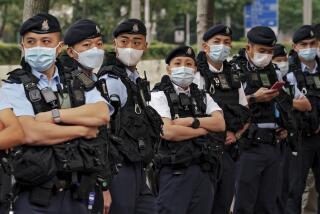Trial of 94 Suspected Muslim Militants Opens
- Share via
CAIRO — The trial of 94 suspected Muslim militants, including two prominent preachers, charged with forming or belonging to a secret group began Sunday in an Egyptian military court.
Some of the men face additional charges, including plotting to assassinate security officials, planning to blow up government economic institutions, possessing weapons without a license and receiving military training abroad.
Seven of the 94 men are being tried in absentia.
Eight men are charged with forming the secret group; the others are accused of membership in the group, according to a list of charges read out in court.
It was not immediately clear how many of the defendants face the extra charges or what sentences they could receive.
“Nothing is ruled out in military courts,” defense lawyer Youssef Saqr said, adding that he did not expect the men to receive the death penalty.
If convicted by the court, the men have no right to appeal.
The main defendant, Nashat Ahmed Mohammed Ibrahim, a prominent preacher, said he was not guilty.
“I have been preaching for 27 years, and they have never found anything wrong with my sermons,” he said.
Lawyers said that they thought it was the first time that Egypt had tried preachers in a military court.
Egypt put the preacher Sheik Omar Abdel Rahman, now in jail in the United States for his part in a plot to blow up New York City landmarks in 1993, on trial in a state security court, where he faced charges of issuing a religious ruling justifying the 1981 assassination of President Anwar Sadat.
The defendants in Sunday’s trial also included a film cameraman and a pilot, three Egyptian defendants who carried U.S., Dutch or German nationality, a Yemeni and three men from the southern Russian republic of Dagestan.
One Dagestani man, who said his uncle was also among the defendants, said the three accused Dagestanis had all been students at Egypt’s Al Azhar University.
“After 70 years under communism, we came here to study Islam. How could we be treated like this?” said Mohammed Fakhr Din.
During the last month, Egyptian authorities have referred several hundred suspected Muslim militants to military jurisdiction, prompting accusations from human rights groups that Egypt was using the U.S.-led war on terrorism to settle scores with its political enemies.
More to Read
Sign up for Essential California
The most important California stories and recommendations in your inbox every morning.
You may occasionally receive promotional content from the Los Angeles Times.













